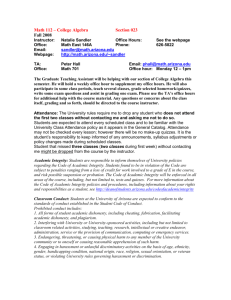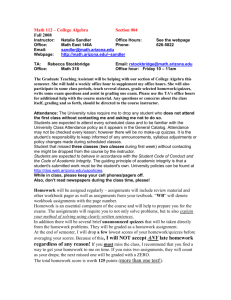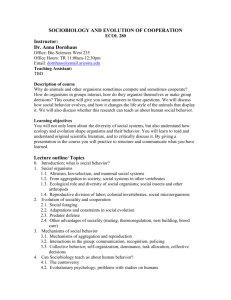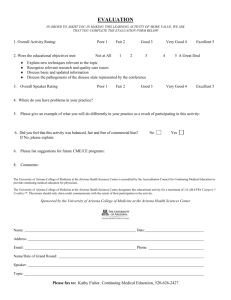Fundamentals of Industrial and Environmental Health
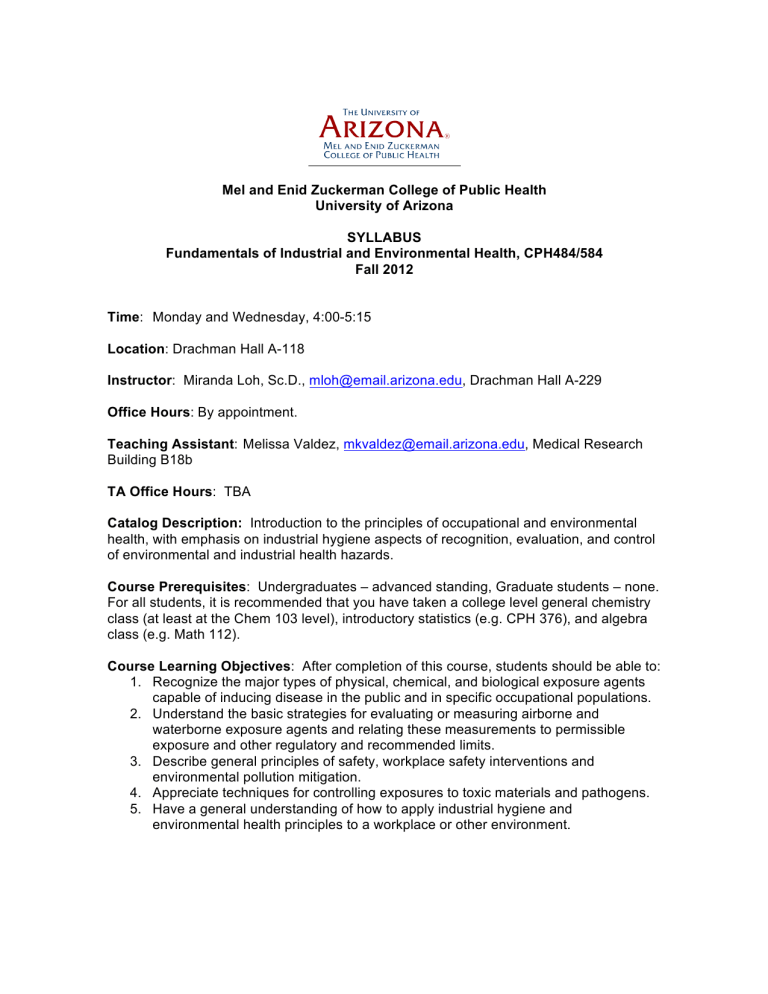
Mel and Enid Zuckerman College of Public Health
University of Arizona
SYLLABUS
Fundamentals of Industrial and Environmental Health, CPH484/584
Fall 2012
Time : Monday and Wednesday, 4:00-5:15
Location : Drachman Hall A-118
Instructor : Miranda Loh, Sc.D., mloh@email.arizona.edu
, Drachman Hall A-229
Office Hours : By appointment.
Teaching Assistant : Melissa Valdez, mkvaldez@email.arizona.edu
, Medical Research
Building B18b
TA Office Hours : TBA
Catalog Description: Introduction to the principles of occupational and environmental health, with emphasis on industrial hygiene aspects of recognition, evaluation, and control of environmental and industrial health hazards.
Course Prerequisites : Undergraduates – advanced standing, Graduate students – none.
For all students, it is recommended that you have taken a college level general chemistry class (at least at the Chem 103 level), introductory statistics (e.g. CPH 376), and algebra class (e.g. Math 112).
Course Learning Objectives : After completion of this course, students should be able to:
1. Recognize the major types of physical, chemical, and biological exposure agents capable of inducing disease in the public and in specific occupational populations.
2. Understand the basic strategies for evaluating or measuring airborne and waterborne exposure agents and relating these measurements to permissible exposure and other regulatory and recommended limits.
3. Describe general principles of safety, workplace safety interventions and environmental pollution mitigation.
4. Appreciate techniques for controlling exposures to toxic materials and pathogens.
5. Have a general understanding of how to apply industrial hygiene and environmental health principles to a workplace or other environment.
MPH Competencies
ANALYTICAL SKILLS:
Defines a problem
Determines appropriate uses and limitations of data
Selects and defines variables relevant to defined public health problems
Evaluates the integrity and comparability of data and identifies gaps in data sources
Understands how the data illuminates ethical, political, scientific, economic, and overall public health issues
Understanding basic research designs used in public health
Makes relevant inferences from data
COMNUNICATION SKILLS:
Communicates effectively both in writing and orally (unless a handicap precludes one of those forms of communication)
BASIC PUBLIC HEALTH SCIENCE SKILLS:
Understanding research methods in all basic public health sciences
Applying the basic public health sciences including behavioral and social sciences, biostatistics, epidemiology, environmental public health, and prevention of chronic and infectious diseases and injuries
Course Notes : Lecture notes will be provided on d2l (http://d2l.arizona.edu). They will generally be posted by noon the day of the lecture.
Recommended Texts/Readings : The textbook for the course is Fundamentals of
Industrial Hygiene 5 th Ed., published by the National Safety Council. It is available at the medical school bookstore or on reserve in the library. Supplemental articles will be provided as well, usually on D2L. Any required readings not on the syllabus will be announced and made available a week in advance.
Course Requirements : All students will be required to complete homework assignments, a midterm exam, and a final exam. In addition, there will be 6 pop quizzes on the readings and previous lecture. You may drop the lowest 2 of these – this means there are no make-up quizzes. Graduate students will be expected to complete a paper.
While not required, I highly recommend for graduate students (enrolled in 584) to take or have taken LIBR 696A, to help prepare the paper assignment.
Grading/Student Evaluation :
The grading system for this course is based on the following items.
Undergraduates
Quizzes: (4 @ 5 points)
Homework: (5 @ 20 points)
Midterm exam: (50 points)
Final exam: (50 points)
Graduates:
Quizzes: (4 @ 5 points)
Homework: (5 @ 20 points)
Paper: (50 points)
20
100
50
50
220
20
100
50
Midterm exam: (50 points)
Final Exam: (50 points)
50
50
270
Final grades will be based on the following relative point system:
A = 90-100%
B = 75-89%
C = 65-74%
E = < 65
• Quizzes will be given unannounced at the beginning of class. There will be 6 all semester but only the top 4 grades count. This means there are NO MAKE-UP quizzes. If you must be absent from class for any reason and a quiz is given on that day, you should plan to count that towards one of your dropped quizzes.
Quizzes will be on the readings and/or the previous lecture.
• Assignments will be marked down 10% per day it is late (beginning at the end of class on the day the assignment is due, e.g. if an assignment is due Monday, it will be marked down 10% if it is turned in at 5:30pm). It is the student’s responsibility to make sure his/her assignments are turned in on time. If you know you will be absent from class the day an assignment is due, please contact Dr. Loh in advance to arrange for an alternative time to turn it in.
• You must take an exam during the specified time. There will be no make-ups.
400/500 Co-Convened Courses: Students in 485 and 584 will be given separate assignments. 584 students will be expected to be more analytical in their assignments and to think more critically about the questions, beyond what has been presented in class.
Additionally 584 students will complete a literature review paper. Although not required, concurrent or previous enrollment in LIBR 696 would be beneficial for 584 students in relationship to the paper.
Class Attendance/Participation : You are expected to attend class and participate by responding to rhetorical questions, submit the assignments on time, take exams on the specified dates.
All holidays or special events observed by organized religions will be honored for those students who show affiliation with that particular religion. Absences pre-approved by the
UA Dean of Students (or Dean’s designee will be honored.)
Communications: You are responsible for reading emails sent to your UA and D2L account from your professor and the announcements that are placed on the course web site. Information about readings, news events, your grades, assignments and other course related topics will be communicated to you with these electronic methods. The official policy can be found at: http://www.registrar.arizona.edu/emailpolicy.htm
Disability Accommodation: If you anticipate issues related to the format or requirements of this course, please meet with me. I would like us to discuss ways to ensure your full participation in the course. If you determine that formal, disability-related accommodations are necessary, it is very important that you be registered with Disability Resources (621-
3268; drc.arizona.edu) and notify me of your eligibility for reasonable accommodations. We can then plan how best to coordinate your accommodations. The official policy can be found at: http://catalog.arizona.edu/2012%2D13/policies/disability.htm
Academic Integrity: All UA students are responsible for upholding the University of
Arizona Code of Academic Integrity, available through the office of the Dean of Students and online: The official policy found at: http://deanofstudents.arizona.edu/codeofacademicintegrity
Classroom Behavior: The Dean of Students has set up expected standards for student behaviors and has defined and identified what is disruptive and threatening behavior. This information is available at: http://deanofstudents.arizona.edu/disruptiveandthreateningstudentguidelines
Students are expected to be familiar with the UA Policy on Disruptive and Threatening
Student Behavior in an Instructional Setting found at: http://policy.arizona.edu/disruptivebehavior-instructional and the Policy on Threatening Behavior by Students found at: http://deanofstudents.arizona.edu/sites/deanofstudents.arizona.edu/files/Disruptive_threat
_bklt_2012.pdf
Grievance Policy: Should a student feel he or she has been treated unfairly, there are a number of resources available. With few exceptions, students should first attempt to resolve difficulties informally by bringing those concerns directly to the person responsible for the action, or with the student's graduate advisor, Assistant Dean for Student and
Alumni Affairs, department head, or the immediate supervisor of the person responsible for the action. If the problem cannot be resolved informally, the student may file a formal grievance using the Graduate College Grievance Policy found at: http://grad.arizona.edu/academics/policies/academic-policies/grievance-policy
Grade Appeal Policy: http://catalog.arizona.edu/2012-13/policies/gradappeal.htm
Syllabus Changes: Information contained in the course syllabus, other than the grade and absence policies, may be subject to change with reasonable advance notice, as deemed appropriate.
Please Note: You may need to copy the above URLs into the web browser. URLs change frequently. You will need to test the URLs in the syllabus you produce each semester, to ensure the links are correct.
Telephone and Computer Use: You are not allowed to have your computer on during class. Turn your cell phones to silent or vibrate in order to not disrupt the class and disturb your fellow students and professor.
Plagiarism: What counts as plagiarism?
•
Copying and pasting information from a web site or another source, and then revising it so that it sounds like your original idea.
• Doing an assignment/essay/take home test with a friend and then handing in separate assignments that contain the same ideas, language, phrases, etc.
•
Quoting a passage without quotation marks or citations, so that it looks like your own.
•
Paraphrasing a passage without citing it, so that it looks like your own.
•
Hiring another person to do your work for you, or purchasing a paper through any of the on- or off-line sources.
Course Schedule : (Dates of classes, topics, assignments, readings, examinations)
Class Topic/Objective Reading
August 20
Homework due
August 22
Course overview and expectations
Assessing risks to environmental hazards
•
Risk assessment paradigm
•
Risk management
Masters 4.1-
4.4
August 27 Masters 4.5-
4.6
August 29
Sept 3
Sept 5
Sept 10
Dose-response
•
Toxicology and epidemiology
• Uncertainties
Exposure assessment
• Defining exposure
• Exposure pathways/routes
• Biomarkers
NO CLASS (Labor Day)
Estimating exposure
• Measurements
• Modeling
Risk characterization and management
Masters 4.7-
4.9
Klepeis, Ott
Yassi, chapter
4 selections
Sept 12
Sept 17
Sept 19
Sept 24
• Connecting exposure and health impact
•
Examples
Air quality
•
Types of pollutants
•
Regulations
Air quality
•
Gases – properties, assessment and control
Air quality
• Particles – properties, assessment and control
Air quality
• Indoor and workplace air quality
Townsend article
Ch. 7
Ch. 8
Jayjock, Keil,
Reinke
HW 1 due
Sept 26
Oct 1
Oct 3
Oct 8
Air quality review
Water – Kelly Reynolds
Microbes – Kelly Reynolds
Review
Oct 10
Oct 15
Oct 17
October 20
(Saturday)
October 22
October 24
EXAM
Noise
•
Properties
• Quantification
Noise
•
Exposure
•
Controls
HAZWOPER training – optional
Noise review
Workplace assessment
HAZWOPER training - optional October 27
(Saturday)
October 29
October 31
November 5
November 7
Ergonomics – Terry Stobbe
Safety – Terry Stobbe
Radiation
Radiation
November 12 NO CLASS! (Veteran’s Day)
November 14 Thermal stress
November 19 Thermal stress
November 21 NO CLASS! (Day before
Thanksgiving)
November 26 Mirror lab prep talk
November 28 Mirror lab
December 3
December 5
TBA
Review
December 10 Final exam (3:30-5:30pm)
TBA
TBA
Ch 9
Ch. 13
Ch. 10
Ch. 11
Ch. 12
HW 2 due
HW 3 due
HW 4 due
HW5 due
Paper due


